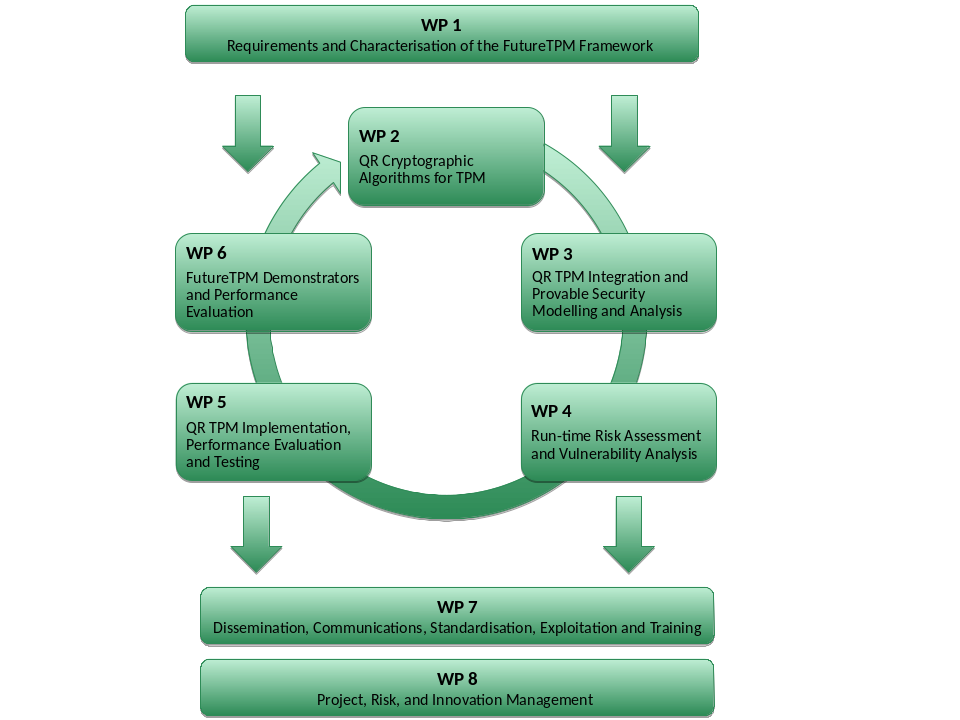Technical Approach
The FutureTPM project is planned to run for 36 months. It is organized into eight work packages (WP) with significant dependencies and expected synergies between them which are described shortly in the following:

- WP1: Requirements and Characterisation of the FutureTPM Framework
This work package will be responsible for analysing the general requirements and properties for the FutureTPM solution - WP2: QR Cryptographic Algorithms for TPM
WP2 will identify, design and develop quantum-resistant cryptographic primitives and algorithms for use in future TPMs. The final outputs of this task will be a selection of candidate cryptographic algorithms and protocols, selected for both security and performance in various contexts, and suitable for use in a QR TPM. - WP3: QR TPM Integration and Provable Security Modelling and Analysis
This work package aims to develop holistic security models for the entire TPM and its functionalities, integrate the QR algorithms developed in WP2 into a full TPM, and perform a formal security analysis of the resulting full TPM specification with respect to the identified security models, and including, where relevant, parts of its TSS. The final output of this WP is a provably-secure specification for a quantum-resistant TPM, based on algorithms developed in WP2. - WP4: Run-time Risk Assessment and Vulnerability Analysis
In WP4, threats will be identified and a vulnerability model and risk assessment methodology for a QR TPM-based system will be established. Furthermore, a reactive run-time risk assessment and mitigation framework to ensure security of use cases in the face of emerging threats and vulnerabilities will be developed. - WP5: QR TPM Implementation, Performance Evaluation and Testing
WP5 will implement and validate Quantum Resistant (QR) TPM algorithms in software, hardware, and virtualisation environments, as well as the TPM Software Stack (TSS) associated with the QR TPM algorithms. Further, side-channel and tamper-resistance countermeasures in the different QR scenarios and performance for QR algorithms in the different QR scenarios are evaluated. - WP6: FutureTPM Demonstrators and Performance Evaluation
The purpose of this WP focuses on: (i) the detailed definition of the technical integrated endpoints and active planning of the integration of the different implementation components developed in WPs 2, 4, and 5, and (ii) the application, testing, refinement and finalization of the FutureTPM framework to the three use cases, defined in WP1, in order to assess its architectural soundness. - WP7: Dissemination, Communications, Standardisation, Exploitation and Training
WP7 obtains inputs from all other WPs and ensures the communication and dissemination of results achieved within the individual WPs to the outside parties as well as to participating entities. Further, WP7 will support the partners to exploit the achieved results and impacts on the European and international market. Results within each WP will lead to contributions for training measures, coordinated by this WP. - WP8: Project, Risk, and Innovation Management
WP8 is responsible for the operational management and technical vitality of the project encompassing management components on contractual, financial, legal, technical, administrative and ethical levels. Another focus of WP8 is to respond to opportunities, which is addressed by active innovation management. These activities will help to maximize the benefit to participants, project stakeholders and the overall project impact.

